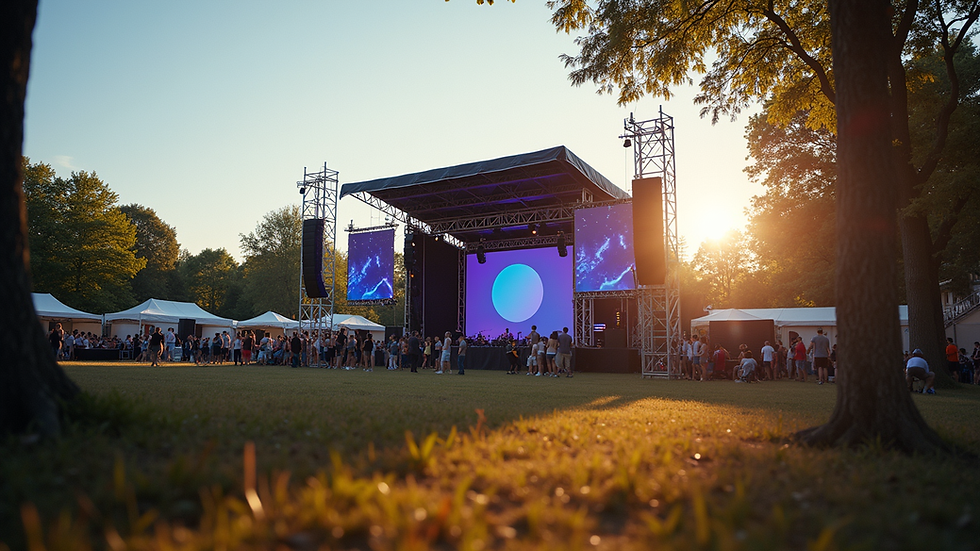Enhance Your Events with Proven Marketing Strategies
- Denzel Merritt

- Jun 28, 2025
- 4 min read
Marketing your event effectively is crucial to its success. Whether it's a conference, festival, or workshop, using the right strategies can significantly impact attendance and engagement. This blog post will outline some proven event promotion strategies to enhance your events, ensuring that they stand out and attract your target audience.
Event Promotion Strategies
Effective event promotion is more than just sending out invites. It involves a complete marketing strategy that covers various channels and approaches. Here are key strategies to ensure the success of your event:
Build a Compelling Event Website
Your event website is your digital hub. It should include details like the event date, location, agenda, speakers, and ticket information. Use engaging visuals and clear calls to action (CTAs) to encourage visitors to register. Websites should also be mobile-friendly as many users will access information via their smartphones.

A colorful event website displayed on a laptop screen. Leverage Social Media
Social media platforms are powerful tools for event marketing. Create dedicated social media profiles for your event or use existing ones to promote it. Use engaging content, such as videos, polls, and infographics, to generate interest. Consider using paid ads to further extend your reach.
Email Marketing Campaigns
Email marketing remains one of the most effective ways to communicate with potential attendees. Create segmented lists based on previous attendees or interest levels, and tailor your messages accordingly. Send regular updates leading up to the event, and include links for easy registration.

An email marketing dashboard showcasing event updates. Engage with Attendees Pre-Event
Encourage engagement before the event by asking attendees to share what they’re most excited about. Use hashtags to create a buzz on social media. You might also host contests or giveaways related to the event, which can incentivize sharing and increase visibility.
Partnerships and Sponsorships
Collaborating with other brands or companies can give your event added credibility and reach. Seek out partners who align with your event's theme or target audience. In return for sponsorship, offer sponsors visibility in event materials, website listings, and social media shout-outs.
What are the 5 P's of Event Marketing?
Understanding the 5 P's of event marketing can provide a structured approach to your planning process. These elements help ensure that your event gets the audience it deserves.
Product
This refers to the actual event being offered. Define your event’s unique selling proposition (USP). What differentiates it from similar events?
Price
Determine your pricing strategy. Consider factors like competition, target audience, and costs. Offering early-bird discounts can incentivize early registration.
Place
The location of your event can greatly influence attendance. Choose a venue that is accessible and can accommodate your expected numbers.
Promotion
This involves all the strategies you will implement to get the word out about your event. This includes social media, email lists, press releases, and more, as discussed above.
People
The success of your event largely hinges on its attendees and staff. Understand who your target audience is and make sure you cater to their interests and needs. Consider their demographics, preferences, and what would most engage them.
Utilize Event Technology
Incorporating technology into your event can improve attendee experiences and streamline logistics.
Event Apps
Many events now use dedicated apps for registration, scheduling, and networking. Attendees can access the agenda, connect with other participants, and receive real-time updates.

Virtual Elements
Consider offering a hybrid model where both in-person and virtual options are available. This widens your audience reach. Use live-streaming tools to engage virtual attendees and involve them in discussions.
Data Analytics
Collecting data from your attendees can provide invaluable insights. Use surveys to gather feedback and attendance metrics to analyze what worked and what didn't. Analyze registration patterns to determine your most effective marketing strategies.
Promote Your Event through Content Marketing
Content marketing can greatly enhance your event promotion strategy. Here’s how to implement it effectively:
Create a Blog
Write blog posts related to your event's theme, guest speakers, or relevant industry topics. This will increase your visibility and establish authority.
SEO Optimization
Make sure your website and content are optimized for search engines. Use relevant keywords, including long-tail keywords. Don't forget to include your event's location and date to improve local search visibility.
Engaging Visuals
Incorporate videos and images in your promotional material. This not only captures attention but also helps break down complex information for your audience.
Share User-Generated Content
Encourage past attendees to share their experiences through testimonials, photos, or videos. This authentic content can boost credibility and encourage new attendees to join.
Build Relationships with Influencers
Partnering with influencers can extend your event's reach. Identify influencers who align with your event's target audience and invite them to attend as guests or speakers.
Event Promotion
Influencers can share your event with their followers, amplifying your marketing efforts. Ensure they have the correct information and easy access to promotional materials.
Creating Buzz
Use influencers to create buzz leading up to the event. They can utilize social media to post teasers or behind-the-scenes content.
Post-Event Engagement
After the event, ask influencers to share their experiences. Their insights can provide organic post-event promotion that keeps the conversation going.
Final Thoughts
Enhancing your event requires a well-rounded approach to marketing. Focus on building a strong website, utilizing social media effectively, and engaging with your audience through email and content marketing. Don't overlook the power of partnerships and technology to create a memorable experience.
Remember, each event presents a unique opportunity to connect with your audience, and by employing these event marketing strategies, you'll significantly increase the likelihood of a successful outcome.
Incorporate these strategies, monitor your results, and be ready to adapt. The event landscape is dynamic, and staying ahead requires consistent effort and innovation. Happy planning!






Comments